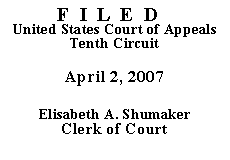

| MICHAEL TREVINO,
v.
GARY WATKINS, Warden F.C.F.;
ATTORNEY GENERAL OF THE
STATE OF COLORADO |
|
Mr. Trevino pled guilty to second-degree kidnapping and aggravated robbery in 1992, and he was sentenced to a total of fifty-eight years in prison. On December 7, 2005, he filed a 2254 petition in the district court, alleging that his trial counsel was ineffective in allowing him to plead guilty rather than investigating a possible insanity defense. In the petition, Mr. Trevino stated that he filed a motion for state post-conviction relief pursuant to Colo. R. Crim. P. 35(c) on June 6, 2003. Given that his conviction had become final almost a decade earlier, a magistrate judge ordered Mr. Trevino to show cause why his 2254 petition should not be dismissed as untimely. When he failed to do so, the district court dismissed his petition.
In his application for a COA, Mr. Trevino contended that his motion for state post-conviction relief was actually filed on February 28, 1995, well before the one-year limitation period began running. See Gibson v. Klinger, 232 F.3d 799, 803 (10th Cir. 2000) (recognizing that the one year limitation period of § 2254(d) runs from April 24, 1996, for convictions that became final prior to the enactment of that section). He further alleged that his motion remained pending for more than ten years and was finally resolved on May 14, 2005, when the Colorado Supreme Court denied his petition for certiorari. The State concedes this, and it submits that the federal limitation period was tolled pursuant to § 2244(d)(2) during the pendency of Mr. Trevino's state proceedings. Thus, the parties agree that Mr. Trevino's federal habeas petition, filed less than seven months after his state motion was definitively resolved, was timely.
We will grant a COA where "reasonable jurists could debate whether . . . the petition should have been resolved in a different manner or that the issues presented were adequate to deserve encouragement to proceed further." Slack v. McDaniel, 529 U.S. 473, 484 (2000) (internal citations and quotation marks omitted). Given that the timeliness of Mr. Trevino's federal petition is now undisputed, the district court's procedural ruling is debatable among jurists. Furthermore, Mr. Trevino has alleged a colorable constitutional claim (which apparently was supported by expert testimony in his state proceeding), and his allegation would benefit from further development in the district court.
Accordingly, we GRANT a COA, REVERSE the district court's order and judgment of dismissal, and REMAND for further proceedings consistent with this Order and Judgment. Appellant's motion to proceed in forma pauperis is granted. Entered for the Court
Paul J. Kelly, Jr.
Circuit Judge
*. This order and judgment is not binding precedent, except under the doctrines of law of the case, res judicata, and collateral estoppel. It may be cited, however, for its persuasive value consistent with Fed. R. App. P. 32.1 and 10th Cir. R. 32.1.
2. After examining the briefs and the appellate record, this three-judge panel has determined unanimously that oral argument would not be of material assistance in the determination of this appeal. See Fed. R. App. P. 34(a); 10th Cir. R. 34.1(G). The cause is therefore ordered submitted without oral argument.